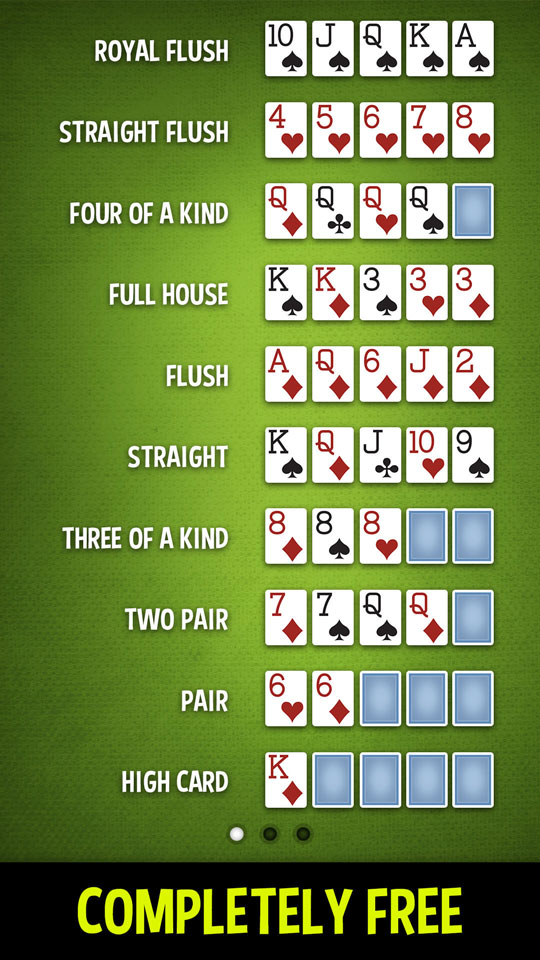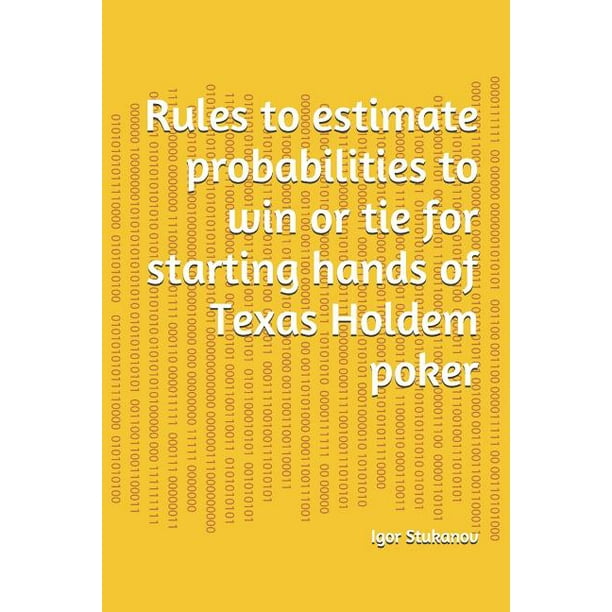Probability Of Winning Hands In Texas Holdem
Playing poker is about playing the odds. The following list gives the odds for outcomes in Texas Hold’em hands. When you realize how heavily the odds are stacked against you, you may want to rethink going all-in before the flop with two suited cards. Use the odds to your advantage:
In Texas Hold’em, the probability any given hand will win is simply: The probability your opponents will fold + the probability your hand will win in a showdown. When we are dealt a hand in Texas Hold'em, we don't care whether we get the A first or the K first (which is what we just worked out), just as long as we get them in our hand it's all the same. There are two possible combinations of being dealt this hand (A K and K A ), so we simply multiply the probability by 2 to get a more useful probability. We have created a poker math and probability PDF chart (link opens in a new window) which lists a variety of probabilities and odds for many of the common events in Texas hold ‘em. This chart includes the two tables above in addition to various starting hand probabilities and common pre-flop match-ups.
1 percent (1-in-100): Percentage of time that no player holds an Ace or a King at a table in a 10-handed game
1 percent (1-in-100): Percentage of time that if you hold two suited cards, you’ll flop a flush
6 percent (about 1-in-20): Percentage of time that five community cards will give pocket suited cards a flush
6 percent (about 1-in-20): Percentage of time that you’ll be dealt a pocket pair
8 percent (about 1-in-12): Percentage of time that you’ll hit at least trips after having a pair on the flop
12 percent (about 1-in-8): Percentage of time that you’ll flop trips if holding a pocket pair
12 percent (about 1-in-8): Percentage of time that two more cards will flop in the same suit as a suited pocket pair
19 percent (about 1-in-5): Percentage of time that the five community cards will at least trip your pocket pair
32 percent (about 1-in-3): Percentage of time that you’ll pair one of your cards on the flop (with no pocket pair)
33 percent (about 1-in-3): Percentage of time that you’ll make a full house or better after having trips on the flop
35 percent (about 1-in-3): Percentage of time that you’ll make a flush on the turn or river if you have four cards to a flush after the flop
The strength of your starting hand in Texas Hold'em can help you determine your chances of winning, even before the remaining cards are dealt. From a pair of aces — the strongest starting hand — to a 2 and a 7, knowing the strength of your starting hand is an important part of your success at the table. When playing Texas Hold'em you need to know which starting hands are worth staying in with—and which you should fold.
Probability Of Hands In Texas Holdem
Best Starting Hands
Having a strong starting hand can help you determine your chances of winning even before the flop is dealt. In general, you're a strong contender if your starting hand contains:
- Ace/Ace: the strongest starting hand in the game.
- King/king, queen/queen, jack/jack: high pairs set you off well.
- An ace with a face card: sets a good foundation, if the flop works in your favor.

Beyond these cards, you'll also often be happy to see cards in sequence, particularly the high cards and face cards, and pairs in your starting hand. While some of these hands aren't always deemed the ideal hands, they can sometimes pay off if you're willing to take a risk. Don't forget the added bonus if your cards are all in the same suit, too. A flush, especially a straight flush or royal flush, can often win you the game. Again, the flop will play a major role in just how strong your chances are at winning, so assess carefully and determine how much risk you're willing to take.
Probability Of Winning Hands In Texas Holdemhold Em

The specific sequence of cards and the order in which they rank is an important aspect of the game. Studying up on the best starting hands in Texas Hold'em can help improve your game and your odds at winning the pot.
A strong starting hand might also encourage you to make a strong blind (your first bet).
Worst Starting Hands
When you're dealt your starting hand, some combinations greatly reduce your chances of winning. These are generally low numbers that are not in sequence or matched. You might consider folding early if your two cards are:
- A 2 or a 3, paired with a 7 or an 8: you can't make a straight out of them.
- An ace or a face card with an unsuited low card: you're taking a risk relying on a single high card.
- Two unmatched, unsuited low cards (like 4 and 7, 5 and 8, etc.): you'll rarely win with these.
The strategy of what to hold, and why, takes a bit to master, so studying the worst starting hands in Texas Hold'em, even more, can help you improve your game.
Beginner's Advice
Play only the cards in the 10-best list and always fold those in the worst hands list. Following this strategy may improve your results. However, there's no guarantee that receiving a strong starting hand will take the round, or that a weak starting hand is a definite loss. You never know how the flop may run, and while an unsuited 2 and 4 might seem like one to deal, sometimes you'll be pleasantly surprised with a two-pair or even a full house. Study up on the various hands you're aiming for.
Probability Of Winning Hands In Texas Holdemem
How you approach the game will also differ based on the game itself. For example, if you're playing No-Limit Hold 'em, knowing the top No-Limit Hold'em hands can help you better understand how to play them.
Probability Of Winning Hands In Texas Holdemem Poker
As your skill increases, you'll also want to learn how position affects your Hold'em starting hand decisions. The more you learn, the more you'll realize how important your starting hands are to your bottom line. Play the good hands and fold the bad, and you'll be well on your way to becoming an expert at Hold'em.